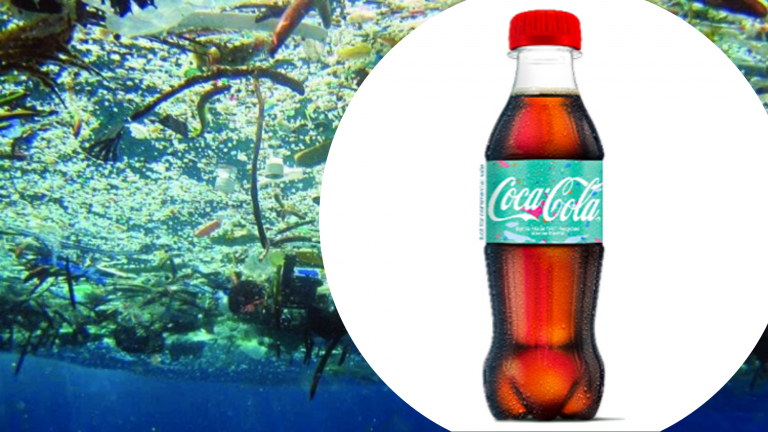This Coca-Cola ad featuring bottles made from recycled marine plastic offers a clear message of environmental responsibility, emphasizing the company’s effort to combat plastic pollution. The core of this ad revolves around the idea that Coca-Cola is taking meaningful steps toward sustainability, particularly in addressing ocean plastic waste, a growing global concern. The first step in achieving this is the introduction of Coca-Cola bottles that include 25% recycled marine plastic that has been collected from beaches and the Mediterranean Sea.
In this Coca-Cola ad, the most prominent visual element is the plastic bottle itself, labelled as being made from recycled marine plastic. The bottle is typically shown against ocean imagery or scenes that evoke environmental awareness. The ocean visuals signify Coca-Cola’s effort to protect the environment and reduce plastic waste in the seas, linking the product with positive environmental action. Using recycled marine plastic is a particularly clever strategy because it highlights the brand’s commitment to tackling plastic pollution at its source. Marine plastic has become a symbol of the environmental crisis, with millions of tons entering the oceans yearly, killing marine life and contaminating ecosystems. By visibly addressing this issue, Coca-Cola tries to align its brand with solutions to these urgent environmental challenges.
The ad aims to convince consumers to support Coca-Cola’s products not solely because of any brand loyalty that the consumer may have but because of Coca-Cola’s environmentally friendly practices appealing to the more environmentally conscious generations such as Generation Z (GenZ). It aims to convince people that purchasing Coca-Cola products indirectly contributes to the reduction of ocean plastic waste. Coca-Cola is presenting itself as a company that shares the growing environmental concern, and by doing so is inviting consumers to make environmentally conscious purchasing decisions. This has two potential effects: it could make those who continue to purchase Coca-Cola products, feel that by doing so, they are making a positive environmental impact. It could also appeal to consumers seeking to minimize their ecological footprint but may not want to give up on their favourite brands.
In addition to younger audiences, this campaign may appeal to urban consumers who live near coastal areas or are directly affected by ocean pollution. By using marine plastic in its bottles, Coca-Cola is addressing a tangible issue that resonates with people who are conscious of the environmental harm caused by plastic waste. These consumers are likely to appreciate the company’s efforts to reduce ocean pollution through practical, visible measures.
The advertisement, like Coca-Cola’s broader messaging around sustainability, seeks to convince consumers to support the brand for its product and its role in mitigating environmental damage. In this case, the campaign urges consumers to buy into the idea that choosing Coca-Cola products aligns with supporting a cleaner, healthier planet. By highlighting the use of recycled marine plastic, the ad encourages viewers to associate the brand with positive environmental change, thus attempting to shift consumer behaviour towards purchasing products that are perceived as eco-friendly. According to White et al. (2019), social and environmental influences are key in shifting consumer behaviours to be more sustainable. Coca-Cola is leveraging this insight by appealing to consumers’ desire to participate in reducing ocean plastic waste.
However, despite the campaign’s appeal, Coca-Cola’s environmental efforts have faced considerable criticism, especially for the large-scale production of plastic bottles. Coca-Cola remains the world’s largest plastic polluter, producing billions of single-use plastic bottles yearly. Environmental groups like Greenpeace have argued that while campaigns emphasizing the use of recycled materials, such as marine plastic, are positive steps, they are insufficient to address the broader issue of Coca-Cola’s overall plastic output. Critics view such initiatives as an attempt to distract from the company’s larger environmental footprint, arguing that the company’s reliance on single-use plastics continues to contribute significantly to global plastic pollution.
Moreover, there is growing concern that this campaign may be perceived as “greenwashing”. While Coca-Cola’s recycled marine plastic bottles represent a step in the right direction, Gatti, Seele, and Rademacher (2019) argue that consumers are becoming increasingly skeptical of green marketing claims, particularly from large corporations with historically poor environmental records. If consumers view this campaign as an attempt to distract from Coca-Cola’s broader environmental impact, it could undermine the company’s efforts to build trust with eco-conscious consumers.
Coca-Cola’s advertisement campaign for bottles made with recycled marine plastic is a strategic effort to reposition the brand as an environmentally responsible company. By addressing the issue of ocean plastic pollution, Coca-Cola taps into the growing consumer demand for sustainable products and corporate transparency. However, the campaign’s success depends on whether consumers view it as a genuine effort or an instance of greenwashing. The use of visuals combined with the company’s messaging about sustainability, positions Coca-Cola as a socially responsible brand but only time will tell whether the public embraces this new identity or questions its authenticity.
Bibliography:
White, Katherine, Rishad Habib, and David J. Hardisty. “How to SHIFT Consumer Behaviors to be More Sustainable: A Literature Review and Guiding Framework.” Journal of Marketing 83, no. 3 (2019): 22-49. https://doi.org/10.1177/0022242919825649.
Gatti, Lucia, Peter Seele, and Lutz Rademacher. “Grey Zone in – Greenwash Out: A Review of Greenwashing Research and Implications for the Voluntary-Mandatory Transition of CSR.” International Journal of Corporate Social Responsibility 4, no. 6 (2019) https://doi.org/10.1186/s40991-019-0044-9.


Brook Harrington
Hi Nathan,
You made a great choice in picking this as your greenwashing advertisement. You did a good job in covering what was being shown in the advertisement, and neatly explained how a consumer’s choices could be impacted by this advertisement.
You also brought up some great points on how Coca Cola has a history of non environmental production, and how they are the largest plastic producers in the world. It makes you question if the amount of recycled plastics they put in the bottles even makes that much of a dent into the total amount of plastics they produce.
The sources you used were good choices too. Having a study discuss that a consumer’s choices could be affected by social and environmental concerns was a great inclusion to this paper. The citation discussing how consumers are also becoming more aware of greenwashing in their advertising was a good inclusion too.
Something you could work on would be to include more citations to information you found. Where did you find out Coca Cola was the top plastic producer? Where was it stated that Coca Cola’s bottles would now be using 25% recycled material, and was it only for these ocean branded bottles? Another element to mention would be to make sure your bibliography at the end of your essay is in alphabetical order.
Overall, this was a strong piece analysing some of the greenwashing Coca Cola does.